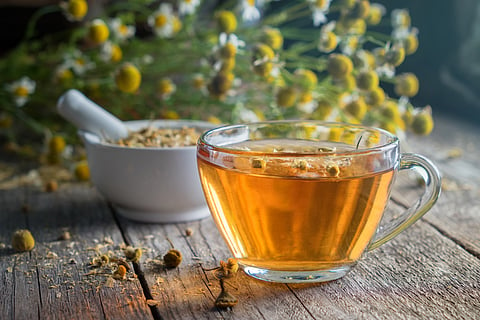Chamomile is a familiar herb and when brewed in tea, it's a popular element in alternative and holistic medicine.
Where does it come from, what health benefits does it offer and most important, is it safe? Dr. Chiti Parikh, a New York City specialist in internal medicine, weighed in with what you need to know about the health properties of chamomile.
What is chamomile?
Texts from ancient Egypt, ancient Greece and ancient Rome mention using the herb as a medicine, according to the U.S. National Center for Complementary and Integrative Health (NCCIH).
It's a daisy-like plant touted to relieve sleeplessness, anxiety and stomach upsets.
People often drink it in tea form, but Parikh noted that it’s also available as supplement in capsule form, and it’s even used in warm baths.
Potential health benefits of chamomile
"[Chamomile] is commonly used for anxiety, relaxation and sleep,” said Parikh, executive director of integrative health and wellbeing at New York-Presbyterian, in collaboration with Weill Cornell Medicine.
Other chamomile benefits include easing:
Safety of chamomile
The NCCIH says chamomile is "likely safe when used in amounts commonly found in teas." It is also safe to take orally for medicinal purposes "over the short term," NCCIH says.
"The long-term safety of using chamomile on the skin for medicinal purposes is unknown," the center adds.
In addition, little is known about its safety for use during pregnancy or breastfeeding, according to NCCIH.
Side effects of chamomile
Is chamomile tea good for you? Some small studies have shown that women who used it every day throughout pregnancy had a slightly higher risk for early delivery as well as lower birth weight compared to mothers who did not use chamomile, Parikh said.
"I typically do not recommend [pregnant people] using it daily,” she said.
Some people have an allergic reaction to chamomile -- and that's more apt to happen if they are allergic to other plants in the same family, such as daisies, ragweed, marigolds and chrysanthemums.
While small doses of chamomile tea don’t affect the blood, Parikh noted that high amounts -- say, 4 to 5 cups per day -- can “have a blood-thinning effect.”
Potential drug interactions of chamomile
If you take warfarin, aspirin or other blood-thinning medications, limit yourself to no more than 3 cups of chamomile tea a day, Parikh suggested.
Other drug interactions with chamomile are possible.
NCCIH notes that interactions between chamomile and cyclosporine, a drug used to prevent transplant organ rejection, have been reported. Chamomile might interact with other drugs as well, the agency says.
"Talk to your health care provider before taking chamomile if you're taking any type of medication," the NCCIH recommends.
Dosage
A guide from New York-based Mount Sinai lists doses for various forms of chamomile -- from tea to creams and in the bath.
It suggests drinking 3 to 4 cups of chamomile tea between meals; or gargling with it up to three times a day. For a cough, add a few drops of chamomile essential oil to hot water and breathe deep. Or try chamomile-containing cream for psoriasis, eczema or dry and flaky skin, the guide suggests.
What the medical expert says
“[Chamomile is] a safe compound that has been used for a long time,” Parikh said.
Bottom line
Not all experts agree about the benefits and effectiveness of chamomile. Contact your doctor or other health care provider before you try chamomile.
SOURCE: Chiti Parikh, MD, executive director, Integrative Health and Wellbeing Program, New York-Presbyterian, in collaboration with Weill Cornell Medicine, New York City
References
U.S. National Center for Complementary and Integrative Health: Chamomile
Mount Sinai: German Chamomile


